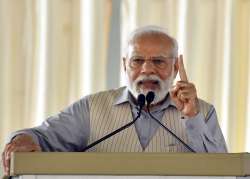PM Modi on his France visit: I see India as a strong shoulder for ‘Global South'
PM Modi is on France visit from July 13-14 as he is the guest of honour at the annual Bastille Day Parade.

Prime Minister Narendra Modi on Thursday (morning) departed for France, at the official invitation of French President Emmanuel Macron. PM Modi is on France visit France from July 13-14. He will be the guest of honour at the annual Bastille Day Parade, which will see the participation of a 269-member Indian tri-service contingent.
In this rare interview with french publication Les Echos, the Prime Minister insisted on India's role as a bridge between the Global South and the western world. The rights of the Global South have been long denied PM Modi said. As a result, there is a feeling of anguish among these countries, he added. A strong advocate of a comprehensive reshuffle of the Bretton Woods international institutions, the Indian Prime minister claimed that his country, now the most populous in the world, needs to regain its rightful place. This is not just a credibility issue for the UN, Modi emphasised. How can the UN Security Council claim to speak for the world when its most populous country, and its largest democracy, is not a permanent member?, he asked, adding that President Emmanuel Macron of France, a strategic partner in the Asia-Pacific region, shared his views on the international order.
Excerpts:
On India becoming the most populous country
Today, India is the most youthful nation in the world. India's strongest asset is our youth. At a time when many countries in the world are ageing and their populations are shrinking, India's young and skilled workforce will be an asset to the world over the decades to come.
On India-US relations
It is true that the relationship has been growing positively since the turn of the century. It has accelerated and reached new levels in the past nine years. There is widespread support for deepening our ties, from all stakeholders, in both countries - be it Government, Parliament, Industry, Academia and of course the people. The US Congress has consistently extended bipartisan support for elevating our relationship. As the challenges to the international order have grown, our partnership is responding with a great sense of urgency and purpose. Trust, mutual confidence and belief in the relationship have been key ingredients. Advancing a free, open, inclusive and balanced Indo-Pacific region, is a shared goal. We pursue this with other partners in the region and beyond.
On India's permanent membership in UNSC
The UN Security Council, in particular, epitomizes this dissonance. How can we talk of it as a primary organ of a global body, when entire continents of Africa and Latin America are ignored? How can it claim to speak for the world when its most populous country, and its largest democracy, is not a permanent member? And its skewed membership leads to opaque decision-making processes, which adds to its helplessness in addressing the challenges of today. I think most countries are clear on what changes they would like to see in the UN Security Council, including the role India should play.
Vision for India in 2047
We are working with a clear vision for 2047, the 100th anniversary of our independence. We want to see India become a developed country in 2047. A developed economy that caters to the needs of all its people - education, health, infrastructure and opportunities.
On Indian economy
Our economic development has always been guided by a people-centric approach. So far, we have built more than 40 million homes for the poor and 110 million toilets for proper sanitation. We have opened bank accounts for around 500 million people & provided 400 million microcredit loans. We have provided cooking gas connections to 90 million households and 500 million people get free health insurance coverage. Today, 46 % of real time digital payments globally happen in India. Initiatives like Production Linked Incentive Scheme and the National Infrastructure Pipeline project have given a massive boost to manufacturing in India. Our economy is now the world's fi!h largest and on track to become the third largest very soon.
On China
India has always stood for peaceful resolution of differences through dialogue and diplomacy, and for respecting sovereignty of all nations, international law and the rules-based international order. This is more important than ever for maintaining mutual trust and confidence.
On Russia-Ukraine War
India's stand has been clear, transparent and consistent. I have said that it is not an era of war. We have urged both sides to resolve issues through dialogue and diplomacy. I told them that India is ready to support all genuine efforts that can help bring this conflict to an end.